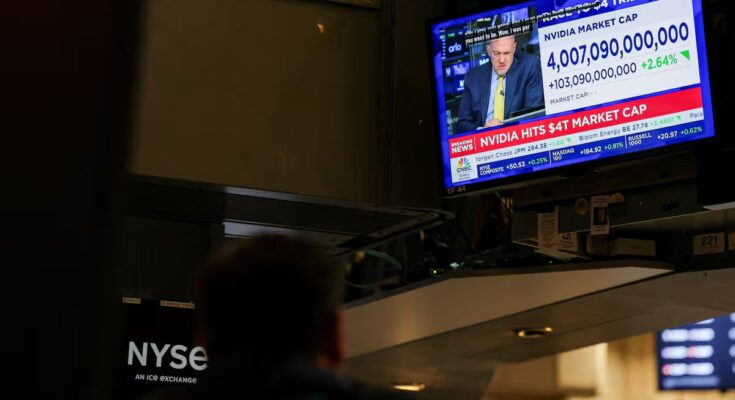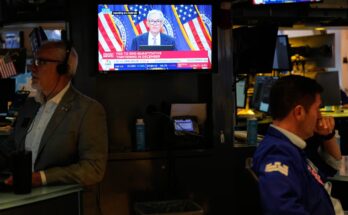The stock market and artificial intelligence (AI) need to give themselves some time. As in those relationships where the initial crush becomes toxic. Investors around the world are wary of the very high prices of many technology companies. Wall Street stocks have appreciated 36% from April lows in the AI heat, but this week some alarms have begun to sound.
The rumor that a bubble is forming around the development of artificial intelligence, cloud computing centers and the semiconductor industry has been the gray noise in the financial markets for weeks. The International Monetary Fund (IMF) warned a month ago that US stocks were overvalued. There is also a feeling among fund managers that technology stocks are very expensive. The cracks of a potential artificial intelligence bubble became more visible Tuesday. The guru who once warned of the subprime mortgage crisis – investor Michel Burry, in 2008 – has revealed he is betting against two technology companies: microprocessor maker Nvidia and Palantir Technologies. The latter’s stock collapsed by 8% during the session: the company announced that it had a turnover of 3.4 billion dollars, but was worth half a billion on the stock market.
Messages from several Wall Street executives were added to Burry’s predictions. The CEOs of Morgan Stanley, Goldman Sachs and Capital Group acknowledged that North American stocks are expensive relative to their historical price and that a correction was to be expected, which they said could be a healthy corrective for the market. That same Tuesday, the Nasdaq tech index fell 2%, its biggest drop in nearly a month. The general index of the American stock market, the S&P 500, lost 1.2%.
The next day, fears spread across the Pacific and last morning several Asian companies recorded significant declines. Specifically, South Korean microchip makers Samsung Electronics and SK Hynix experienced corrections early in the session, which were later eased. Japan’s Advantest fell as much as 10%, while Asia’s largest public company, Taiwan Semiconductor Manufacturing Co (TSMC), lost 3%. They are all Nvidia suppliers. Overall, listed companies dedicated to semiconductors have left more than 500 billion dollars (435 billion euros) in capitalization. This small tsunami has already reached the European stock markets in a very subtle way and the cracks in the AI bubble seemed less worrying than the day before. Tuesday’s crash, however, served as a reminder that stock market excesses can be costly.
Reasonable doubts
The great fear of professional investors is how justified the valuations of giants such as Nvidia (which has exceeded five trillion dollars in capitalization), Oracle and OpenAI (which is not listed on the stock exchange) are justified. On paper, the adoption of AI-based algorithms will generate huge productivity improvements across all types of economic sectors. That’s why the companies that run these algorithms are growing and increasing their computing capacity. The hiring of new data processing equipment, which, in turn, increases sales of microprocessors and graphics cards.
Furthermore, in several cases these involve cross-shareholdings, supply contracts and investment commitments. A clear sign of a speculative spiral. The big questions now are: at what point will we start to see returns in companies that adopt AI solutions? And how long will the demand for this technology increase? “The strength of the discourse on artificial intelligence is remarkable,” says Giordano Lombrado, founder of Plenisfer Investments. “Pessimistic analysts can be counted on one hand and are constantly proven wrong by the latest market news. Not a day goes by without a new strategic alliance being announced in the tech world, while CEOs across industries feel compelled to mention AI in analyst conferences.”
Luciano Díez-Canedo, president of the bank manager Singular AM (with 2.8 billion in assets under management), qualifies this vision. “In investment committees we have been discussing the high valuation of technology stocks for a long time, but I have the impression that these fears have not yet reached the streets, it is not something that clients ask us about.”
“There has been much more nervousness than usual in the last few sessions, and this is not a good sign,” Alexandre Baradez, chief market analyst at IG in Paris, told Bloomberg. “The market assumed that everything would go perfectly, which is why doubts about stock valuations, liquidity levels or rate cuts ended up having such an impact.” One of the most frequently reported concerns by fund managers concerns the degree of concentration of the US stock market in a handful of stocks.
Laurent Denize, investment director of the Franco-German manager ODDO BHF, uses a very graphic simile to explain what is happening. “We are all on the AI train, which travels very fast and can derail, but no one wants to get off yet so as not to miss the last part of the rally.”



